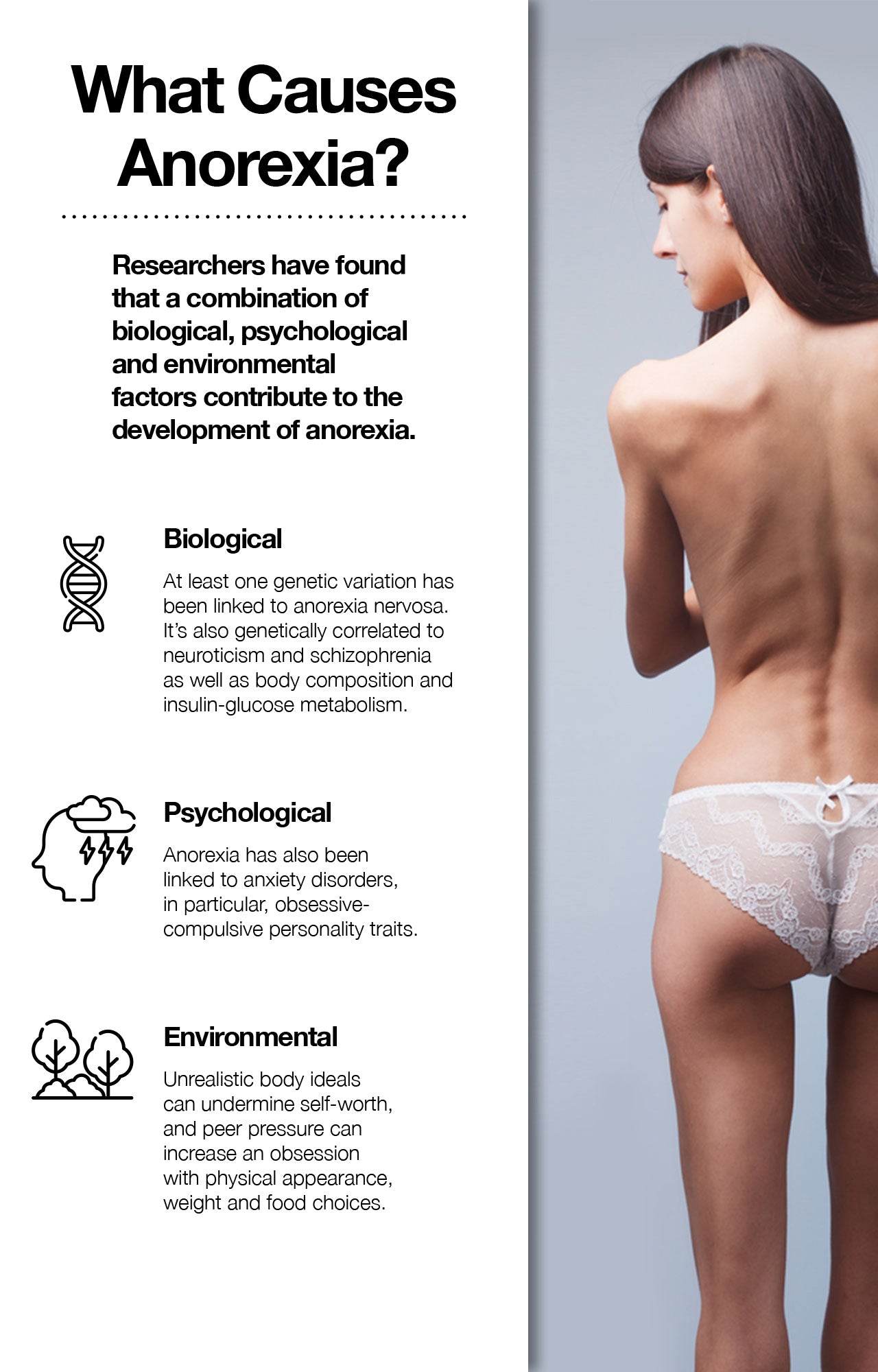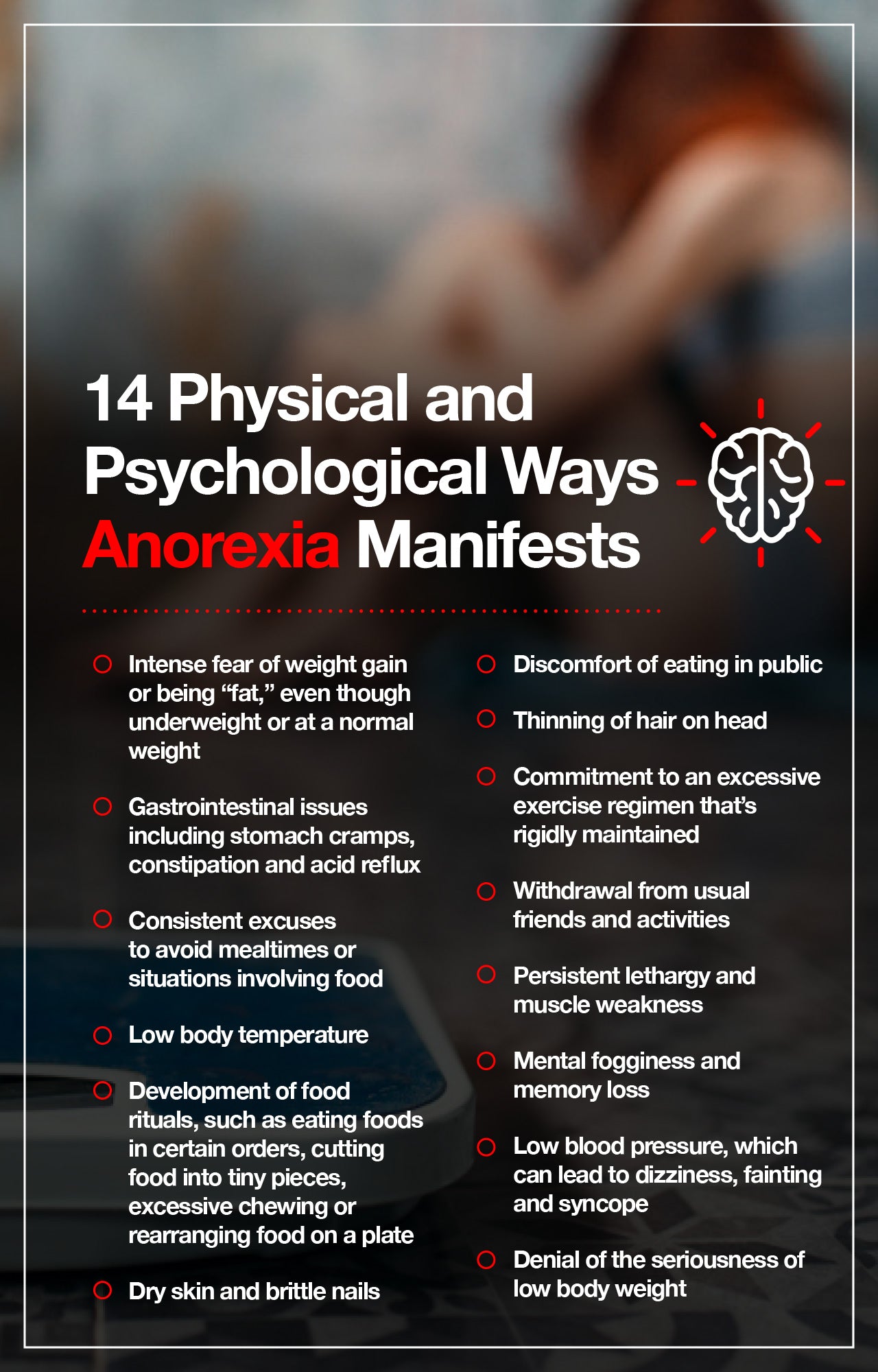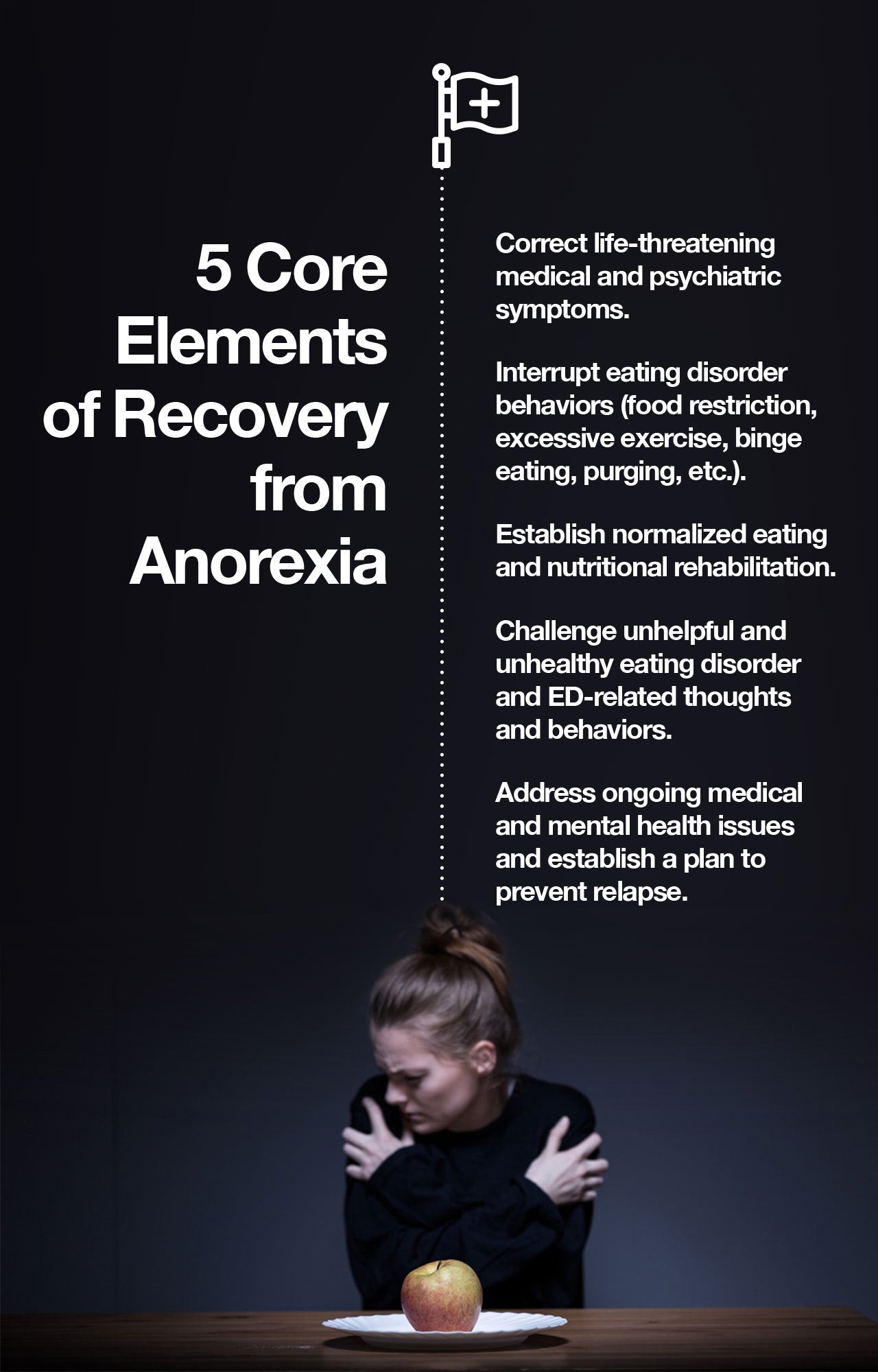Understanding Anorexia Nervosa, a Complex Yet Treatable Illness
 By: by Amino Science
By: by Amino Science

Despite common misconceptions and stereotypes, anorexia nervosa and other eating disorders are complex illnesses that affect people of all ages, genders, sizes, ethnicities, and socioeconomic statuses and backgrounds.
Perhaps the greatest challenge faced by professionals seeking to draw attention to warning signs of anorexia, as well as evidence-based therapies used for the treatment of anorexia, is responsibly navigating the social and psychological forces that can both ignite as well as fan the flames of an eating disorder. Information intended to encourage individuals suffering from eating disorders to seek treatment can instead intensify disordered eating behaviors.
While the mental and physical effects of anorexia can be quite serious, and in some cases, life-threatening, experts have identified a variety of effective interventions that can help individuals with eating disorders change the way they relate to their bodies and to food. If you or a loved one are suffering, know this: recovery tends to be a long, and occasionally difficult process, but it is achievable.
What Is Anorexia Nervosa?
The National Eating Disorders Association (NEDA), the largest nonprofit organization dedicated to supporting individuals and families affected by eating disorders, defines anorexia nervosa as an eating disorder characterized by weight loss (in growing children, this may present as a lack of appropriate weight gain), often in combination with distorted body image.
It's typical for individuals with anorexia to restrict both the number of calories they consume as well as the kinds of food they eat. In some cases, individuals may also exercise compulsively to burn off the calories they consume or purge via vomiting or laxatives, though not to the same extent as individuals with bulimia nervosa. Some individuals with anorexia may also exhibit binge eating behaviors in combination with restriction and purging behaviors.
It's vital to grasp that you cannot know whether someone is struggling with anorexia based on their physical appearance. The media tends to use images of underweight and emaciated girls and women who also tend to be white when covering anorexia nervosa, but the truth is that this mental health disorder can affect all kinds of people.
Studies show that larger-bodied individuals can also have anorexia, though it's less common for these individuals to be diagnosed with the condition due to negative cultural attitudes.
And statistics indicate that men and boys currently account for approximately one out of every three people with an eating disorder, though they are far less likely to seek treatment due to increased stigma.
How Doctors Diagnose Anorexia Nervosa
It's common for the first symptoms of anorexia to coincide with the onset of puberty, but medical professionals have reported increasing rates of diagnoses in children as well as older adults.
The Diagnostic and Statistical Manual of Mental Disorders 5th Edition (DSM-5), a set of guidelines established by the American Psychiatric Association (APA) for different types of mental illnesses, lists the following diagnostic criteria for anorexia nervosa.
- Restriction of energy intake relative to requirements, leading to a significantly low body weight in the context of age, sex, developmental trajectory, and physical health.
- Intense fear of gaining weight or becoming fat, even though underweight.
- Disturbance in the way in which one's body weight or shape is experienced, undue influence of body weight or shape on self-evaluation, or denial of the seriousness of the current low body weight.
That said, NEDA and other leaders in the world of eating disorder treatment emphasize that individuals may not meet one or more of those criteria and still be dealing with a serious eating disorder. Mental health conditions present differently from person to person, and even the most carefully composed diagnostic criteria will fail to encompass all the ways a complicated condition like anorexia nervosa might present.
The Biological, Psychological, and Environmental Causes of Anorexia
There is no single cause of anorexia nervosa, but researchers have identified a variety of risk factors that increase the likelihood someone will develop the condition.
Anorexia is more common in women than in men and tends to run in families. Individuals with anxiety or perfectionist tendencies may be more likely to develop anorexia than their peers. People who have suffered a traumatic event, such as a job loss, death in the family, or relationship breakup, may also be at a higher risk.
"As with many diseases, it's probably a combination of biological, psychological and environmental factors," states a report issued by the Mayo Clinic.
1. Biological
A groundbreaking study published in 2017 identified a clear genetic variant related to the development of anorexia nervosa.
A team led by researchers from King’s College London, the University of North Carolina, and Stanford analyzed more than 10 million genetic variations across the genome of more than 3,495 individuals with anorexia nervosa as well as 10,982 unaffected individuals. This allowed them to pinpoint a genetic variant on chromosome 12, in a region previously associated with type 1 diabetes and autoimmune disorders, that appears to be associated with anorexia nervosa.
The researchers found genetic correlations between anorexia nervosa and psychiatric conditions like neuroticism and schizophrenia, confirming what many practitioners have already found to be true. Some individuals have identifiable genetic tendencies toward perfectionism, sensitivity, and perseverance, traits which predispose someone to developing anorexia nervosa.
Unexpectedly, they also found strong correlations with various metabolic features, such as body composition and insulin-glucose metabolism. The findings indicate anorexia may be a metabolic as well as psychological condition and opens up the possibility of new treatment approaches.
2. Psychological
Experts have identified powerful links between anxiety disorders—and obsessive-compulsive personality traits in particular—and anorexia.
One reason why this might be is that a combination of traits, such as a tendency to develop rituals, a strong need for control, and inflexible thinking, make it more possible for individuals to adhere to restrictive diets and maintain an inadequate food intake for their bodies' energetic needs.
An extreme drive toward perfectionism can contribute to inaccurate perceptions of weight and shape as well as a persistent desire to pursue increased thinness, while engaging in restrictive eating may become a way to soothe anxiety.
3. Environmental
Cultural expectations of feminine beauty in the Western world, and increasingly, around the globe, make thinness a prerequisite. For women, a sense of self-worth can be predicated on how well they embody that unattainable ideal. Peer pressure can also contribute to the desire to be hyper-focused on weight.
Masculine individuals must also contend with unrealistic physical standards, though the focus tends to be on musculature.

Recognizing Signs and Symptoms of Anorexia
If you're concerned about your own relationship to food and your physical body, or worried about a loved one, it can be helpful to have a sense of common signs and symptoms of anorexia nervosa.
Because anorexia nervosa is a multifaceted condition, symptoms can present in many different ways. Often, psychological symptoms will present first, while physical symptoms develop as a person's body struggles to function without adequate nutrients.

Psychological Signs of Anorexia Nervosa
The following emotional and behavioral warning signs of anorexia were compiled from a consultation of resources provided by the NEDA and other sources created by medical professionals.
- Preoccupation with weight, food, and calories
- Refusal to eat certain foods, which can progress to restricting whole categories of food (ex: no carbohydrates)
- Intense fear of weight gain or being “fat,” even though underweight or at a normal weight
- Frequent comments about feeling “fat” or overweight despite weight loss
- Regular measuring and weighing as well as inspection of their bodies in the mirror
- Warped perception of body weight or body shape
- Undue influence of weight or shape on self-esteem
- Resistance or inability to maintain a body weight appropriate for their age, height, and build
- Habit of cooking meals for others without eating
- Misrepresentation of amount of food eaten previously
- Consistent excuses to avoid mealtimes or situations involving food
- Development of food rituals, such as eating foods in certain orders, cutting food into tiny pieces, excessive chewing, or rearranging food on a plate
- Discomfort with eating in public
- Expression of need to “burn off” calories taken in
- Commitment to excessive exercise regimen that's rigidly maintained
- Withdrawal from usual friends and activities
- Mental fogginess and memory loss
- Denial of the seriousness of low body weight
Physical Symptoms of Anorexia Nervosa
The same sources cited above were used to cull the following physical manifestations of anorexia.
- Gastrointestinal issues including stomach cramps, constipation, and acid reflux
- Low blood pressure, which can lead to dizziness, fainting, and syncope
- Low body temperature
- Development of amenorrhea, an abnormal absence of menstruation, or loss of three consecutive menstrual cycles
- Difficulty sleeping
- Dry skin
- Brittle nails
- Persistent lethargy and muscle weakness
- Abnormal laboratory findings (anemia, low thyroid and hormone levels, low potassium, low blood cell counts, slow heart rate)
- Thinning of hair on head
- Cuts and calluses across the top of finger joints (a consequence of inducing vomiting)
- Cavities, or discoloration of teeth (same cause mentioned above)
- Swelling around area of salivary glands
- Fine hair on body (lanugo)
- Mottled or swollen hands and feet
- Poor wound healing
- Impaired immune functioning
- Extreme weight loss or an emaciated appearance
If you notice a family member or friend exhibiting severe dieting habits and dissatisfaction with their appearance, contemplate finding a compassionate, nonjudgmental way to speak with them. Keep in mind that they may not be open to having that conversation, or may brush off your concerns. You should not expect to be able to prevent an eating disorder or convince them to adopt a healthier behavior or seek treatment in a single conversation.
Conversely, if you're experiencing any of the symptoms listed above, or believe you may have developed an eating disorder, try to find someone you trust to share that with.
Many people with anorexia do not initially want treatment, as their focus on controlling their food intake and weight takes precedence. Left untreated, however, the malnutrition that accompanies anorexia nervosa can lead to serious conditions. Some sources report that anorexia nervosa has the highest mortality rate of any mental health issue. If you or a loved one is in danger, don’t hesitate to speak to a doctor.
Potential Health Consequences of Anorexia Nervosa
The self-starvation that characterizes anorexia deprives the body of essential nutrients required for normal function. The body responds by slowing down all its internal processes in order to use as little energy as possible. This puts anorexia nervosa patients at risk for a number of medical complications, some of which can be fatal. According to the Mayo Clinic, deaths caused by complications of anorexia can occur suddenly, whether or not someone has become severely underweight.
Because of the body's resilience and adaptability, someone might appear healthy even when they're on the verge of death. The most dangerous complications of anorexia stem from heart problems and electrolyte imbalances, which may go undetected until it's too late.
It's common for individuals with anorexia to have an unnaturally low heart rate, which causes damage to the structure and function of the heart. In fact, heart attack is the most frequent cause of death in anorexia patients.
Other complications linked to anorexia include:
- Anemia
- Osteoporosis, which leads to an increased risk of fractures
- Loss of muscle
- Electrolyte abnormalities, such as low blood potassium, sodium and chloride
- Kidney failure
- Infertility (for women)
- Low testosterone (for men)
If a person with anorexia becomes severely malnourished, every organ in the body can be damaged, including the brain. Food deprivation can actually cause the brain to shrink. In a healthy individual, the brain absorbs a fifth of the calories the body takes in. During periods of starvation, the brain doesn’t get the energy it needs to function appropriately. The damage may not be fully reversible, even when the anorexia is under control.
Anorexia can also have a major impact on an individual's mental health. Certain mental health conditions often coincide with anorexia nervosa, and a negative feedback loop can be created in which as one conditions worsens, the other (or others) do as well. There's an especially high risk of self-injury, suicidal thoughts, or suicide attempts. According to the National Association of Anorexia Nervosa and Associated Disorders, 1 in 5 anorexia deaths is due to suicide.
Because of the body's resilience and adaptability, someone might appear healthy even when they're on the verge of death. The most dangerous complications of anorexia stem from heart arrhythmias and electrolyte imbalances, which may go undetected until it's too late.
It's common for individuals with anorexia to have unnaturally low heart rate, which causes damage to the structure and function of the heart. In fact, heart attack is the most frequent cause of death in anorexia patients.

Treatment for Anorexia Nervosa: There's No One-Size-Fits All Approach
Because anorexia nervosa can have such serious consequences for health, productivity, and relationships, individuals struggling with this disorder will almost always need professional help to recover. Experts report that the earlier a person seeks help, the more likely they are to make a full physical and emotional recovery.
The first step, for many, will be an official diagnosis. This can allow insurance to cover treatment costs, which often involves not only medical and psychiatric services but also psychological and nutritional counseling.
Effective treatment for anorexia must take into account all the factors that can contribute to its development or continuance, from the physical to the psychological to the interpersonal to the cultural.
Many treatment approaches have been shown to be effective in treating eating disorders. No single approach has been shown to be superior, and the most important element when it comes to determining whether a treatment will succeed is how well it suits an individual's needs.
Often, one of the first treatment goals for patients with anorexia is to restore them to a healthy weight. This might involve working with a primary care doctor and dietician who can monitor their health and provide nutritional counseling to change disordered eating habits, as well as with a psychologist with eating disorder experience who can help them identify and reverse distorted beliefs about body image and food.
While treatment approaches differ in many regards, they do have a basic progression, the NEDA states:
- Correct life-threatening medical and psychiatric symptoms.
- Interrupt eating disorder behaviors (food restriction, excessive exercise, binge eating, purging, etc.).
- Establish normalized eating and nutritional rehabilitation.
- Correct nutritional deficiencies with supplements like essential amino acids.
- Challenge unhelpful and unhealthy eating disorder and ED-related thoughts and behaviors.
- Address ongoing medical and mental health issues and establish a plan to prevent relapse.
There are a number of resources available to connect people suffering from anorexia nervosa with treatment providers. A wonderful and comprehensive option is the National Eating Disorders Association website, which features a screening tool. If you would like to seek support to navigate an immediate crisis, you can contact the the toll-free National Eating Disorders Helpline (myneda.org/helpline-chat) or access 24/7 Crisis Support via text (send NEDA to 741-741) at any time, day or night.


Up to 25% off Amino
Shop NowTAGS: conditions
Join the Community
Comments (0)
Most Craveable Recipes




 833-264-6620
833-264-6620



















